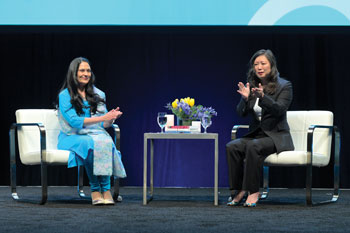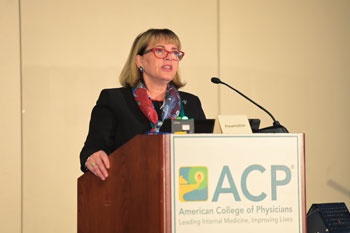Belonging can boost well-being for physicians
A conversation between two experts at an Internal Medicine Meeting plenary session offers five ways to boost physicians' well-being.
The COVID-19 pandemic has been likened to the tip of an iceberg, laying bare the inadequacies of the medical system and prompting reflection, according to Mukta Panda, MD, MACP.
“I think these times, these tumultuous times, are a true test of our vocation. I think it's the time for us to have some deep, difficult, and important conversations, not just to try to unpack what is below the tip of the iceberg, but to question and ask ourselves, why is the iceberg even forming?” she said. “I think we have to lean into that discomfort as a group and individually and realize what is it that we want? Who do we want to be? What is the purpose? And where do we belong?”

In conversation with Tammy L. Lin, MD, MPH, FACP, Governor for ACP's Southern California III Chapter and an ACP Well-being Champion Emerita, Dr. Panda discussed her own experiences and offered attendees advice on answering these questions at a plenary session titled “Reawaken Your Power, Reaffirm Your Value, Reinvent the System” at Internal Medicine Meeting 2022.
Be mindful of “multiple hat syndrome.” Dr. Panda coined this term in 2008, when she became the chair of medicine at her institution. Although she was juggling many roles and had many responsibilities, both her personal and professional lives seemed to others to be going well. Inside, however, it was a different story.
“I was exhausted all the time, tired. I felt everybody around me was doing their work with such ease and efficiency and competence, whereas I was taking so much longer to focus on things, couldn't get my work done, couldn't get it together, creative juices were not flowing,” said Dr. Panda, who is assistant dean for well-being and medical student education and professor of medicine at the University of Tennessee College of Medicine in Chattanooga. “More importantly, when I was not at work, I was irritable and snappy, and just not my best self. And that place was very scary, very lonely.”
In addition to support from trusted friends and family, Dr. Panda found solace in a retreat offered by the Accreditation Council for Graduate Medical Education, which helped her to realize that self-care was not selfish. “That was an aha moment to me, because I realized that I was giving, giving, giving to others without giving to myself where I was completely exhausted. I came from a place of depletion because physically, emotionally, mentally, I just didn't have enough to give,” Dr. Panda said.
Create a community. Dr. Panda came back from the retreat committed to helping the teams she worked with share both their strengths and their vulnerabilities and recharge in real time. One way to do this, she said, is to create relational trust and build principles for a safe community.
An example her own institution follows is giving and receiving welcome to all voices, she said. “When we are talking together in a community, how are we going to be intentional about making sure that every voice is heard?” she asked. “Everybody has a piece of the jigsaw puzzle that we are trying to solve. Every voice is important. It is not right or wrong; it is just different.”
She advised listeners to be curious about those whose beliefs and values might be different from their own and to examine their remarks instead of immediately becoming defensive. She also recommended listening to understand rather than to fix or advise. “That is quite countercultural to us as physicians,” she said.
Share stories. “Our daily life as physicians is sprinkled with moments, small stories of joy, but they'll also be sprinkled with losses and pain, but we don't take time to unpack these stories,” she said. “It is when our story connects with the thread of the story that we are listening to that the human connection is made, that that partnership is built.”
Dr. Panda said that teams at her institution take time at least once a week or once a month to share three things: “Think of something that inspired you, something that surprised you, and something that gave you hope,” she said. “I can tell you, the results are just amazing. … It really attacks that imposter phenomenon. We all realize that we're all in this together, and everybody's faced with the same things.”
Be a leader. To accomplish culture change, all members of the health care team should think of themselves as leaders, Dr. Panda said. “We don't need a title in front of our names, but the way we show up, how we interact with each other, influences the people around us,” she said. “We may lead with our heads, but we don't forget to connect with our hearts. We're going to be empathetic leaders where we hear with each other's ears, we see with each other's eyes, and we feel with each other's hearts.”
To accomplish this, be inquisitive, she advised. Ask team members what aspects of their work keep them up at night, what they need to do their work better, and what gives them meaning and purpose. “If we just allow ourselves to ask these questions, that will help us understand and make us aware of what is the culture in the work that we are doing, in the people that we work with. That will help us understand what are the needs of that culture, and then help us integrate and transform that culture,” Dr. Panda said. “But it has to come from a place of building that trust, and really starting with understanding and awareness.”
Cultivate a broader belonging. Dr. Panda encouraged her listeners to think not only about where they belong but also about how they belong, and how they allow others to belong as well. “For me, it's about believing, believing in the goodness of others and believing in myself, empowering myself with whatever skills and learnings I have, but also empowering others, and being empathetic, always leveraging opportunities for others and myself and listening with empathy,” she said. “It's about being open-minded and optimistic, not forgetting to be nice and nurturing, but always giving back.”



